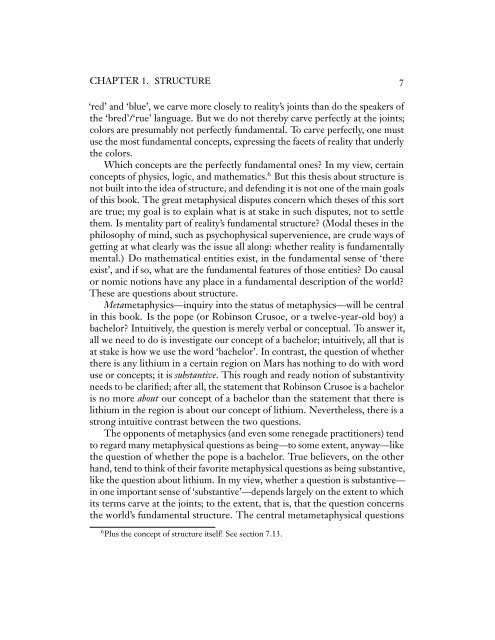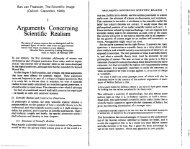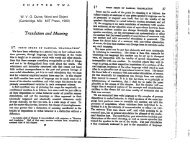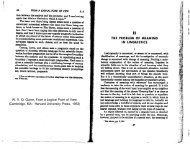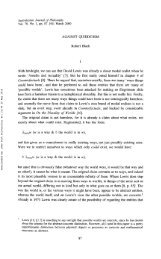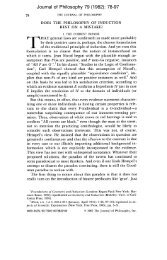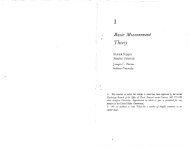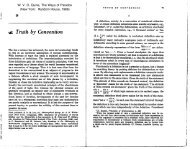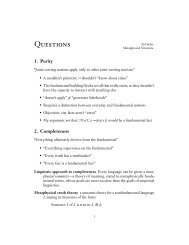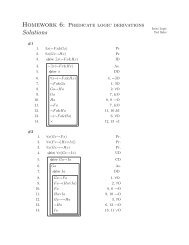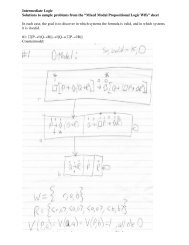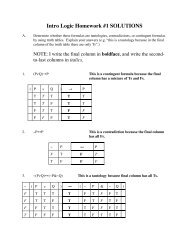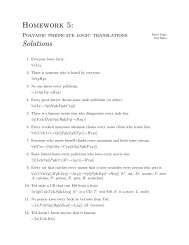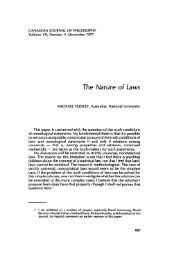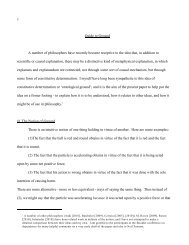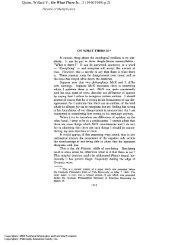Writing the Book of the World - Ted Sider
Writing the Book of the World - Ted Sider
Writing the Book of the World - Ted Sider
You also want an ePaper? Increase the reach of your titles
YUMPU automatically turns print PDFs into web optimized ePapers that Google loves.
CHAPTER 1. STRUCTURE 7<br />
‘red’ and ‘blue’, we carve more closely to reality’s joints than do <strong>the</strong> speakers <strong>of</strong><br />
<strong>the</strong> ‘bred’/‘rue’ language. But we do not <strong>the</strong>reby carve perfectly at <strong>the</strong> joints;<br />
colors are presumably not perfectly fundamental. To carve perfectly, one must<br />
use <strong>the</strong> most fundamental concepts, expressing <strong>the</strong> facets <strong>of</strong> reality that underly<br />
<strong>the</strong> colors.<br />
Which concepts are <strong>the</strong> perfectly fundamental ones? In my view, certain<br />
concepts <strong>of</strong> physics, logic, and ma<strong>the</strong>matics. 6 But this <strong>the</strong>sis about structure is<br />
not built into <strong>the</strong> idea <strong>of</strong> structure, and defending it is not one <strong>of</strong> <strong>the</strong> main goals<br />
<strong>of</strong> this book. The great metaphysical disputes concern which <strong>the</strong>ses <strong>of</strong> this sort<br />
are true; my goal is to explain what is at stake in such disputes, not to settle<br />
<strong>the</strong>m. Is mentality part <strong>of</strong> reality’s fundamental structure? (Modal <strong>the</strong>ses in <strong>the</strong><br />
philosophy <strong>of</strong> mind, such as psychophysical supervenience, are crude ways <strong>of</strong><br />
getting at what clearly was <strong>the</strong> issue all along: whe<strong>the</strong>r reality is fundamentally<br />
mental.) Do ma<strong>the</strong>matical entities exist, in <strong>the</strong> fundamental sense <strong>of</strong> ‘<strong>the</strong>re<br />
exist’, and if so, what are <strong>the</strong> fundamental features <strong>of</strong> those entities? Do causal<br />
or nomic notions have any place in a fundamental description <strong>of</strong> <strong>the</strong> world?<br />
These are questions about structure.<br />
Metametaphysics—inquiry into <strong>the</strong> status <strong>of</strong> metaphysics—will be central<br />
in this book. Is <strong>the</strong> pope (or Robinson Crusoe, or a twelve-year-old boy) a<br />
bachelor? Intuitively, <strong>the</strong> question is merely verbal or conceptual. To answer it,<br />
all we need to do is investigate our concept <strong>of</strong> a bachelor; intuitively, all that is<br />
at stake is how we use <strong>the</strong> word ‘bachelor’. In contrast, <strong>the</strong> question <strong>of</strong> whe<strong>the</strong>r<br />
<strong>the</strong>re is any lithium in a certain region on Mars has nothing to do with word<br />
use or concepts; it is substantive. This rough and ready notion <strong>of</strong> substantivity<br />
needs to be clarified; after all, <strong>the</strong> statement that Robinson Crusoe is a bachelor<br />
is no more about our concept <strong>of</strong> a bachelor than <strong>the</strong> statement that <strong>the</strong>re is<br />
lithium in <strong>the</strong> region is about our concept <strong>of</strong> lithium. Never<strong>the</strong>less, <strong>the</strong>re is a<br />
strong intuitive contrast between <strong>the</strong> two questions.<br />
The opponents <strong>of</strong> metaphysics (and even some renegade practitioners) tend<br />
to regard many metaphysical questions as being—to some extent, anyway—like<br />
<strong>the</strong> question <strong>of</strong> whe<strong>the</strong>r <strong>the</strong> pope is a bachelor. True believers, on <strong>the</strong> o<strong>the</strong>r<br />
hand, tend to think <strong>of</strong> <strong>the</strong>ir favorite metaphysical questions as being substantive,<br />
like <strong>the</strong> question about lithium. In my view, whe<strong>the</strong>r a question is substantive—<br />
in one important sense <strong>of</strong> ‘substantive’—depends largely on <strong>the</strong> extent to which<br />
its terms carve at <strong>the</strong> joints; to <strong>the</strong> extent, that is, that <strong>the</strong> question concerns<br />
<strong>the</strong> world’s fundamental structure. The central metametaphysical questions<br />
6 Plus <strong>the</strong> concept <strong>of</strong> structure itself! See section 7.13.


